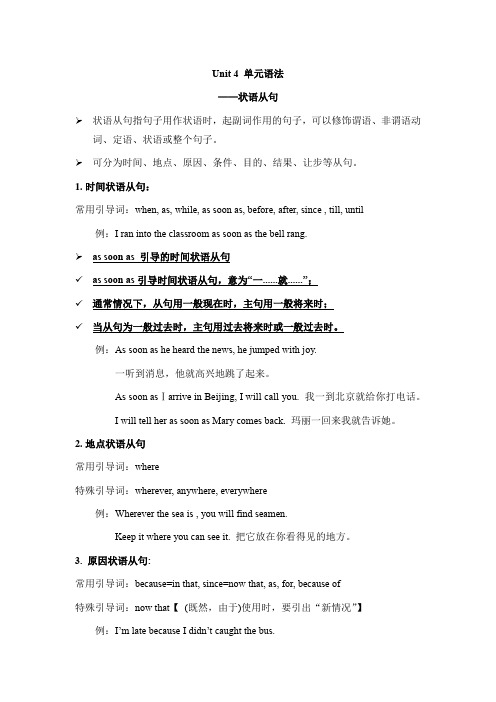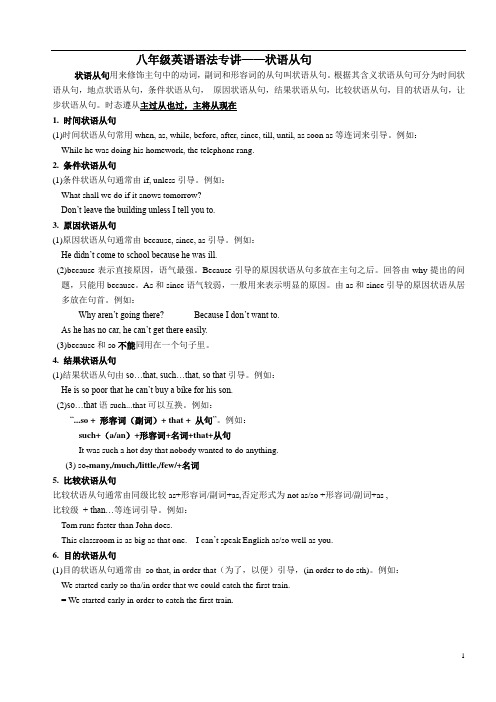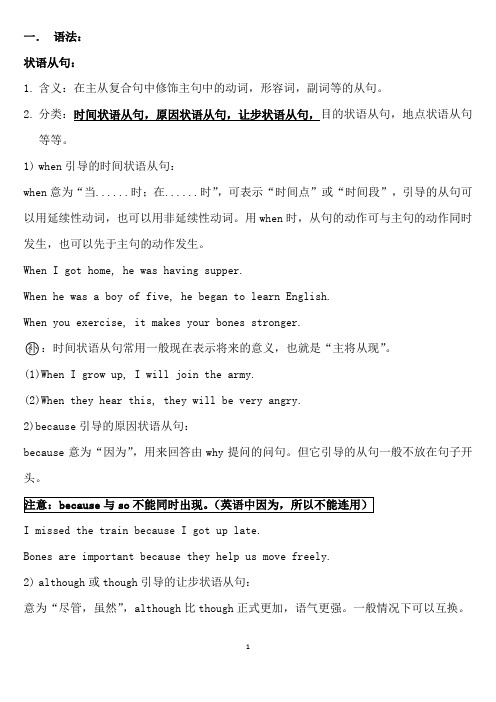第四单元状语从句八年级(可编辑修改word版)
- 格式:docx
- 大小:12.19 KB
- 文档页数:5


Unit 4 单元语法——状语从句➢状语从句指句子用作状语时,起副词作用的句子,可以修饰谓语、非谓语动词、定语、状语或整个句子。
➢可分为时间、地点、原因、条件、目的、结果、让步等从句。
1.时间状语从句:常用引导词:when, as, while, as soon as, before, after, since , till, until 例:I ran into the classroom as soon as the bell rang.➢as soon as 引导的时间状语从句✓as soon as引导时间状语从句,意为“一......就......”;✓通常情况下,从句用一般现在时,主句用一般将来时;✓当从句为一般过去时,主句用过去将来时或一般过去时。
例:As soon as he heard the news, he jumped with joy.一听到消息,他就高兴地跳了起来。
As soon asⅠarrive in Beijing, I will call you. 我一到北京就给你打电话。
I will tell her as soon as Mary comes back. 玛丽一回来我就告诉她。
2.地点状语从句常用引导词:where特殊引导词:wherever, anywhere, everywhere例:Wherever the sea is , you will find seamen.Keep it where you can see it. 把它放在你看得见的地方。
3. 原因状语从句:常用引导词:because=in that, since=now that, as, for, because of特殊引导词:now that【(既然,由于)使用时,要引出“新情况”】例:I’m late because I didn’t caught the bus.She was lucky in that she had many friends to help her.Now that everyone is here, let’s do it.4. 目的状语从句:常用引导词:so that, in order that特殊引导词:for fear that(唯恐/生怕),in the hope that, for the purpose that➢so...that引导的结果状语从句✓“so...that”引导结果状语从句,意为“如此……以至于……”。

八年级英语语法专讲——状语从句状语从句用来修饰主句中的动词,副词和形容词的从句叫状语从句。
根据其含义状语从句可分为时间状语从句,地点状语从句,条件状语从句,原因状语从句,结果状语从句,比较状语从句,目的状语从句,让步状语从句。
时态遵从主过从也过,主将从现在1. 时间状语从句(1)时间状语从句常用when, as, while, before, after, since, till, until, as soon as等连词来引导。
例如:While he was doing his homework, the telephone rang.2. 条件状语从句(1)条件状语从句通常由if, unless引导。
例如:What shall we do if it snows tomorrow?Don’t leave the building unless I tell you to.3. 原因状语从句(1)原因状语从句通常由because, since, as引导。
例如:He didn’t come to school because he was ill.(2)because表示直接原因,语气最强。
Because引导的原因状语从句多放在主句之后。
回答由why提出的问题,只能用because。
As和since语气较弱,一般用来表示明显的原因。
由as和since引导的原因状语从居多放在句首。
例如:------Why aren’t going there?------Because I don’t want to.As he has no car, he can’t get there easily.(3)because和so不能同用在一个句子里。
4. 结果状语从句(1)结果状语从句由so…that, such…that, so that引导。
例如:He is so poor that he can’t buy a bike for his son.(2)so…that语such...that可以互换。

八年级下册状语从句讲解及练习状语从句是用来修饰主句中的动词、副词和形容词的从句。
根据含义,状语从句可以分为时间状语从句、地点状语从句、条件状语从句、原因状语从句、结果状语从句、比较状语从句、目的状语从句和让步状语从句。
时间状语从句通常由when、as、while、before、after、since、till、until、as soon as等连词引导。
例如,昨天我到学校时正下着大雨。
他正在做作业时电话响了。
在时间状语从句中,通常不使用将来时态,而是使用现在时态表示将来的动作或状态。
例如,我一到纽约就给你打电话。
在带有till或until引导的时间状语从句的主从复合句中,如果主句用肯定式,其含义是“一直到……时”,谓语动词只能用延续性动词。
如果主句用否定式,其含义是“直到……才……”、“在……以前不……”,谓语动词可用瞬间动词。
例如,年轻人看书看到灯灭了。
让我们等到雨停了再走。
条件状语从句通常由if和unless引导。
例如,如果明天下雪了,我们该怎么办?除非我告诉你,否则不要离开大楼。
在条件状语从句中,谓语动词通常使用现在时态表示将来的动作或状态。
例如,如果明天有空,我会帮你学英语。
除非他病了,否则他不会迟到。
祈使句+ and (or)+陈述句”在意思上相当于一个带有条件状语从句的复合句。
例如,赶快,否则你会迟到。
如果你不赶快,你会迟到。
努力研究,你就能通过考试。
If you work hard。
you will XXX.XXX like because。
since。
and as。
For example。
"He didn't come to school because he was ill." As and since are weaker than because and are often used to express XXX "why," only because can be used。

初中英语――if 引导的条件状语从句在if 引导的条件状语从句中,if 和条件句位置灵活,可直接放在主句后面,若if 条件句放句首,从句后面要加逗号,和主句隔开。
还要注意前后时态一致原则.引导条件状语从句的连接词主要有:if(如果)、unless(除非)或as long as(只要)等。
unless 在意思上等于if...not。
一、条件状语从句用法1、引导条件状语从句最常用的连词是if,由if 引导的条件状语从句表示在某种条件下某事很可能发生。
如:If you ask him, he will help you.如果你请他帮忙,他会帮你的。
If you fail in the exam, you will let him down.如果你考试不及格,你会让他失望的。
另外,if 从句还表示不可实现的条件或根本不可能存在的条件,也就是一种虚拟的条件或假设,从句多用一般过去时或过去完成时。
如:If I were you, I would invite him to the party.如果我是你,我会邀请他参加聚会。
2、unless = if...not. 除非,若不,除非在……的时候例如:Let's go out for a walk unless you are too tired.=If you are not too tired, let's go out for a walk.Unless it rains, the game will be played.除非下雨,比赛将照常进行。
二、时态问题在条件状语从句中,要注意“主将从现”的规定,即主句用一般将来时,从句用一般现在时表示将来时。
例句:I will come to see you if I have time.我有时间,我就来看你。
三如果if 条件句谈论的是重复发生和预示要发生的情景和事件,则主从句大多用一般现在时态。

一.语法:状语从句:1.含义:在主从复合句中修饰主句中的动词,形容词,副词等的从句。
2.分类:时间状语从句,原因状语从句,让步状语从句,目的状语从句,地点状语从句等等。
1)when引导的时间状语从句:when意为“当......时;在......时”,可表示“时间点”或“时间段”,引导的从句可以用延续性动词,也可以用非延续性动词。
用when时,从句的动作可与主句的动作同时发生,也可以先于主句的动作发生。
When I got home, he was having supper.When he was a boy of five, he began to learn English.When you exercise, it makes your bones stronger.○补:时间状语从句常用一般现在表示将来的意义,也就是“主将从现”。
(1)When I grow up, I will join the army.(2)When they hear this, they will be very angry.2)because引导的原因状语从句:because意为“因为”,用来回答由why提问的问句。
但它引导的从句一般不放在句子开头。
I missed the train because I got up late.Bones are important because they help us move freely.2)although或though引导的让步状语从句:意为“尽管,虽然”,although比though正式更加,语气更强。
一般情况下可以互换。
Although/Though it was rained hard, we still worked in the field.=It was rained hard, but we still worked in the field.Although/Though they are very light, bones are strong enough to support our weight.练习:1.Sarah’s mother can’t make supper, ______ she has a sore hand.A. soB. becauseC. butD. although2. Her grandparents are still in good health_____ they are over eighty.A. thoughB. as soon asC. untilD. because3. ---Would you like some milk?---No, thanks. I don’t like it, ______ I know it’s good for my health.A. becauseB. althoughC. ifD. but4. ___I got back, I found my mother was cooking for me.A. WhenB. BeforeC. SinceD. Although5. _____many children like sugar, I think they had better try not to eat ittoo often.A. BecauseB. WhenC. AlthoughD. If6. Tony never spends money on buying books____ he doesn’t like reading.A. butB. becauseC. thoughD. until7. Amy was reading a book____ I came in.A. whenB. whileC. becauseD. though8.____they have some opposite views, they all think Chinese medicine ishelpful.A. UntilB. AlthoughC. SinceD. Because9. Because he missed the train _____ he couldn’t get there on time.A. soB. /C. butD. though10. _____It rained hard, but we still went there.A. AlthoughB. ThoughC. /D. Because11. _____I grow up, so I can dress myself.A. BecauseB. /C. ButD. When12. Though he is a child,____ he can do everything very well.A. becauseB. butC. /D. so二.句型:用来询问对方情况或询问病人病情的常用语:(with sb.)?=What’s the trouble? 意为“(某人)怎么了?”=What’s wrong?3)回答:如果没事:Oh, it’s OK./It’s nothing.如果有事:I have a headache/fever/ cold.../I don’t feel very well.Eg. (1)---What’s the matter, Tom?---I don’t feel very well.(2)What’s the matter with your?练习:1.What’s the matter____ you?A. forB. withC. inD. from2. ---What’s ____ matter with you?---I have _____ headache.A. a; aB. an; aC. the; aD. the; an3. ---You look worried. What’s the ______?---I have trouble learning English.A. nameB. questionC. troubleD. job三.词语辨析:1.problem与question:1)problem “问题,困难”指难以解决的问题。
Until,so that,although 引导的状语从句什么是状语从句?用作壮语的从句叫做状语从句。
状语从句有从属连词引导(从属连词有that,when,as ,after等)状语从句可分为:时间状语从句,原因,条件,目的,结果和让步状语从句本单元主要学习until,so that although引导的状语从句。
1.Until引导时间状语从句until用于肯定句中,表示“直到···为止”主句中谓语动词是延续的性。
用于否定中,表示“直到····才”主句中的谓语动词是瞬间性的。
Eg:I didin’t recongnize her until she took off her glasses.Eg:I can go out to play basketball until the rain stops.如有否定词Not位于句首时,用Until.Eg:Not until she took off her glasses did I recognise her.直到她摘下眼睛我才认出她。
2 So that引导目的壮语从句so that 引导目的状语从句,谓语动词用can/could/may/might/will/would+动词原形。
Eg:Please turn off the TV so that I can get to sleep.为了我能睡好觉请把电视关了。
Eg:I ran so fast so that I can get the first .我跑得如此的快为了拿第一。
3 Although 引导的是让步状语从句让步状语从句翻译为“尽管····”或“即使·····”。
一般情况下,although与though互换,但两者不能够与but同时出现在同一个句子中。
八年级下册Unit4 状语从句一、单选题(共22道,每道4分)1.—Would you like to go for a walk with me, Alan?—I’d love to, ______ you don’t want to go alone.A.untilB.beforeC.ifD.after答案:C解题思路:until“直到……为止”,before“在……以前”,if“如果;是否”,after“在……以后”。
句意为“——你愿意和我一起去散步吗,艾伦?——我愿意,如果你不想独自去的话”,所以选C。
题中“if(如果)”引导的是条件状语从句。
试题难度:三颗星知识点:状语从句2.Don’t forget to wash your hands ______ you have meals.A.beforeB.untilC.thoughD.unless答案:A解题思路:before“在……以前”,until“直到……为止”,though“虽然;尽管”,unless“除非;如果不”。
句意为“吃饭前不要忘记洗你的手”,所以选A。
题中“before(在……以前)”引导的是时间状语从句。
试题难度:三颗星知识点:状语从句3.Usually, we don’t know how important something is ______ we lose it.A.orB.untilC.as soon asD.after答案:B解题思路:or“或者;也不;否则”,until“直到……为止”,as soon as“一……就……”,after“在……以后”。
句意为“通常,直到我们失去它才知道某事/物的重要”,用到了“not…until…(直到……才……)”,所以答案选B。
题中“until(直到……为止)”引导的是时间状语从句。
试题难度:三颗星知识点:状语从句4.I told him the news ________ he came back yesterday.A.untilB.as soon asC.unlessD.if答案:B解题思路:until“直到……为止”,as soon as“一……就……”,unless“除非;如果不”,if“如果”。
If 引导的条件状语从句If 可以表示是否,也可以表示如果的意思。
当其表示是否时可用来引导宾语从句,而为如果的时候则引导条件状语从句。
一、条件状语从句的定义:在一个复合句中,从句作为主句的条件,所以这个句子是条件状语从句。
二、八年级所学的两种if引导的条件状语从句:(1) if 从句+祈使句,或者调换位置:祈使句+if从句e.g.:If you want to go, please call me. / Please call me if you want to go(2) if 从句+基本句,或者调换位置:基本句+if 从句。
但是在我们本学期学的一般是:用了一般现在时的if 从句+用了一般将来时的基本句。
E.g: I won’t go hiking if it rains tomorrow. 也就是说主句用一般将来时,从句用一般现在时表示将来的意义。
三、考试技巧1. 在选择题中,遇到if的情况,我们首先要判断if的意义是为是否还是如果。
如果表示是否,这个句子为宾语从句,如果是如果,则为条件状语从句。
2. 假如从句是在前面的话,比如,If you don’t go ,I won’t go wither. 这个句子不用多加考虑,一定是条件状语从句。
(为什么呢,自己思考)时间状语从句一、什么是时间状语从句在一个复合句中,从句表达的意思是主句动作或状态发生的时间,那么这个表示时间的从句就叫做时间状语从句。
二、引导词在我们本学期里,我们要掌握的引导词有下面六个:when(当……的时候),while(当……的时候),before(在……之前),after(在……之后), as soon as(一……就……),until(直到……)1. when与while 当……的时候(1)when 引导的时间状语从句,可以表示一个时间点,也可以表示时间段。
所以when引导的从句可以用短暂性动词,也可以用延续性动词。
While引导的从句表示一个时间段,所以while从句中的谓语是延续性动词。
状语从句一.分类:when (当……的时候) while (在……期间) as (当……的时候, 一边……一边……)before (在……之前) since (自从……以来) till/until (直到) hardly…when… (刚……就) as soon as (一……就……)after (在……之后) not…till/until(直到……才)no sooner…than…(刚……就)地点状语从句:where (在那里) wherever(无论哪里)原因状语从句:because (因为) since (因为,既然) as (由于) for (为了) now that(既然)目的状语从句:(so)that=in order that(以便)so as (not)to (以便[不])in case(以免)lest(以免)结果状语从句:so+adj./adv.+that(如此……以致)so that(结果……)such+n.+that(如果……以致)that(所以,因此)让步状语从句:though/although不可同but连用。
though/although (虽然)however (可是)even though(即使)even if (即使)no matter+what/which/where/who/when =whatever/whichever/wherever/whoever/whenever(不论什么/哪一个/哪里/谁/何时)比较状语从句:as (正如)as…as(和……一样)not as/so … as (不如……)than(比……更)the+比较级…+the+比较级(越……越……)条件状语从句:if(假设)unless(如果不)so long as(只要)on condition that (如果)方式状语从句:as(像……那样地)just as(正像)as if(好像)as though(好像)二.各种状语从句的简化方法:1例:After she sang,she left the rich man's house.= After singing,she left the rich man's house.2.以as soon as引导的状语从句的主语若与主句主语一致时,从句等于on+doing sth.,作状语,此时的动词为非延续性动词。
Until,so that,although 引导的状语从句
什么是状语从句?
用作壮语的从句叫做状语从句。
状语从句
有从属连词引导(从属连词有that,when,as ,after 等)
状语从句可分为:时间状语从句,原因,
条件,目的,结果和让步状语从句
本单元主要学习until,so that although 引导的状语从句。
1.Until 引导时间状语从句until 用于肯定句中,表示“直到···为止”主句中谓语动词是延续的性。
用于否定中,表示“直到 ··········才”主句中的谓语动词是瞬间性的。
Eg:I didin’t recongnize her until she took off her glasses.
Eg:I can go out to play basketball until the rain stops.
如有否定词Not 位于句首时,用Until.
Eg:Not until she took off her glasses did I recognise her.
直到她摘下眼睛我才认出她。
2So that 引导目的壮语从句so that 引导目的状语从句,谓语动词用
can/could/may/might/will/would+动词原形。
Eg:Please turn off the TV so that I can get
to sleep.
为了我能睡好觉请把电视关了。
Eg:I ran so fast so that I can get the first .
我跑得如此的快为了拿第一。
3Although 引导的是让步状语从句让步状语从句翻译为“尽管····”或“即使 ·············”。
一般情况下,although 与though 互换,但两者不能够与but 同时出现在同一个句子中。
可与yet
still 连用。
Eg:Although/Though he was tired ,yet he went
On working.
Eg:尽管他很累,他仍旧继续工作。
(翻译)
注意:引导时间状语从句的从连词有:when/as/while/since/as soon as/the
moment=the minuite/by
the time 等。
时间状语从句用一般现在时或现在进行时,主句通常用一般将来时。
Eg: When you go out ,I hope you will tell
me .
当你出去时,我希望你能告诉我。
语法练习:
1.The old man lives a simple life he has a lot of money.
A although
B because
C so
D if
2The teacher speaks very loudly all the students can hear him.
A because
B since Cso that D when
3We did start our discussion everybody arrived.
A if
B until
C while
D since 二.提意见的句型:
1.W hy don’t you/we +动词原形··?我们、、你(们)为什么不···?
Why not+动词原形?为什么不··呢?
Eg:你们为什么不出去打篮球呢?
Eg:为什么不加入一个英语俱乐部?
2.H ow/What about+v-ing···?···怎么样?(同义句1 2) Eg:去打篮球怎么样?
Eg:我们来一杯咖啡怎么样?
3.Shall we+动词原形````? 我们·····好吗?(let’s do sth 同义句转换)
Eg:我们唱首歌好吗?
Eg:我们今天下午做作业好吗?
4.W e/You should+动词原形·····我们、你们应该······
Eg::我们应该早点起床。
5.W ould you mind+宾格或形容词型物主代词+动词-ing```````? 你介意 ···········吗?Eg: 你介意我们在这里说话吗?
6.Will/Would/Could you please+动词原形请你 ··············好吗?
Eg:请你帮我学习英语好吗?
7Would you like to do sth? 你(们)
想要 ···········吗?
Eg:你想出去散散步吗?
7We/You had better (not) do sth. 我们,你们最好/尽可能做 ···········或不要
做 ··············。
Eg:我们尽可能的完成这项工作。
练习
1You had better (do)your homework by yourself.
2Would you please (open) the window? 3Would you mind (move) your car away?
3.L et’s go to the movies(改为同义句)
go to the movies.
4.Why don’ t you read a stroy?(?改为同义句)
reading a stroy?
5Will you please help me with my English?
you please me with my English?。